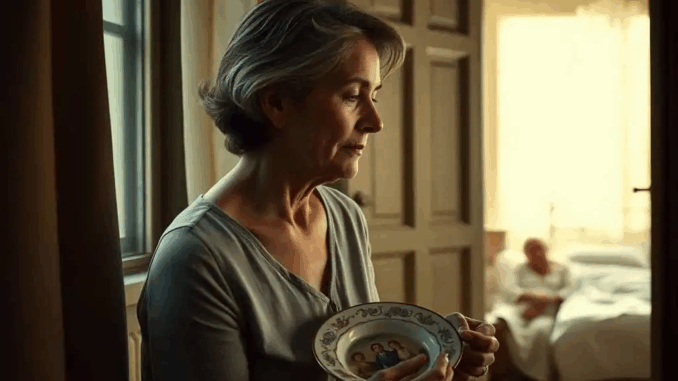

The resentment that lasted thirty years
I haven’t spoken to my mother-in-law, Ana María, for three decades. It all started when, at my wedding with Javier, she gave us a sack of wheat and a set of old plates. I was young then, in love, full of dreams, and that “detail” felt like a slap to the soul. Now Javier, my husband, asks me to look after her because she’s bedridden. “Luisa,” he tells me, “is my mother, she’s alone, who will help her if not us?” And I look at him, thinking: “I don’t want to see your mother, Javier. After everything that’s happened, I don’t have to.” But the situation eats away at me, torn between accumulated resentment and the idea that maybe it’s time to close this chapter.
When we got married, I was floating on cloud nine. We were young, penniless, but love enveloped everything. The wedding was simple, at a village inn, although my parents made an effort to make it beautiful. They gave us money for furniture, friends bought new dishes, but Ana María… She gave us that wheat sack and six faded plates that, judging by the wear, must have been from her own wedding. “So you won’t want for anything,” she said with a smile as if she’d given us jewels. I held back my tears. Not because I expected something luxurious, but because I understood that she didn’t accept me. As if I were less than nothing.
Javier shrugged. “Luisa, don’t give it any importance, my mother is like that, she does it out of love.” But I couldn’t forget it. From the beginning, Ana María made it clear that I wasn’t worthy of her son. She criticized my cooking, my way of running the house, even my clothes. “Luisa, how do you make paella without saffron? It’s not done that way in this family,” she would say, standing in my kitchen like a judge. Every visit was an exam that I failed. After that “gift,” I cut off contact. I told Javier: “Either she respects our space or I don’t want to see her.” He chose me, and we agreed that Ana María would only come when I wasn’t there. Thirty years passed without a word.
During that time, we built our lives. We raised two children, bought an apartment in Valencia, and then a house in the mountains. I worked, took care of everyone, and supported Javier through the tough times. Ana María carried on, living in her tiny apartment with her neighbors and her garden. Javier visited her, brought her money, fixed things, but I stayed out of it. And I was content. I felt no guilt: she decided I didn’t deserve her son. But now everything is different.
A month ago, Javier arrived, taciturn. “Luisa,” he announced, “my mother is bedridden. She’s had a stroke, she can barely move. She needs care.” I expressed my sorrow, but when he added, “I want her to live with us, and I need you to help her,” I gasped. Help her? Her? The woman who humiliated me in front of everyone on my wedding day? Who never apologized or tried to reconcile? I stared at him: “Really? After all, I’m supposed to be her nurse?” He spoke of his old age, his loneliness, his duty as a son. And mine? Where was my dignity?
We argued until dawn. Javier said it was his mother, that time was running out. I tried to explain to him that thirty years of resentment don’t just go away. “Remember when she called me ‘coarse’ in front of everyone? Or the wheat, as if we were beggars?” I yelled. “And now I have to welcome her into my house?” He shook his head: “Luisa, that’s in the past. She’s sick.” But for me, it’s not in the past. It’s an open wound.
I spoke to our daughter, hoping for support. But she said, “Mom, I understand your pain, but Grandma is in a bad way. Maybe you should forgive her.” Forgive? Easy to say. I don’t wish her any harm, but I can’t bear to imagine her here, day after day. I suggested to Javier that we hire a caregiver or take her to a nursing home—we can afford it. But he refused: “She’s not a stranger; she should be with her family.” So, am I the stranger? Why doesn’t anyone think about what I feel?
Now I’m trapped. I see Javier’s suffering. I love him and I don’t want to force him to choose. But I also can’t sacrifice my peace for a woman who never considered me one of her own. I even thought: “What if I accept, but have her apologize?” But I realized: a sick old woman isn’t one for apologies. And I don’t want to be the one who pushes her to the sidelines.
For now, I’ve asked for time. Javier nodded, but I sense his disappointment. I… am exhausted. Exhausted of holding a grudge, of feeling guilty. Am I being too resentful? How can I forget three decades of contempt? I don’t know what to do. Maybe time will clarify. In the meantime, I’m trying to maintain some peace—for Javier, for our family. But one thing is certain: Ana María won’t step foot on this threshold until I’m ready. If I ever am.
Để lại một phản hồi